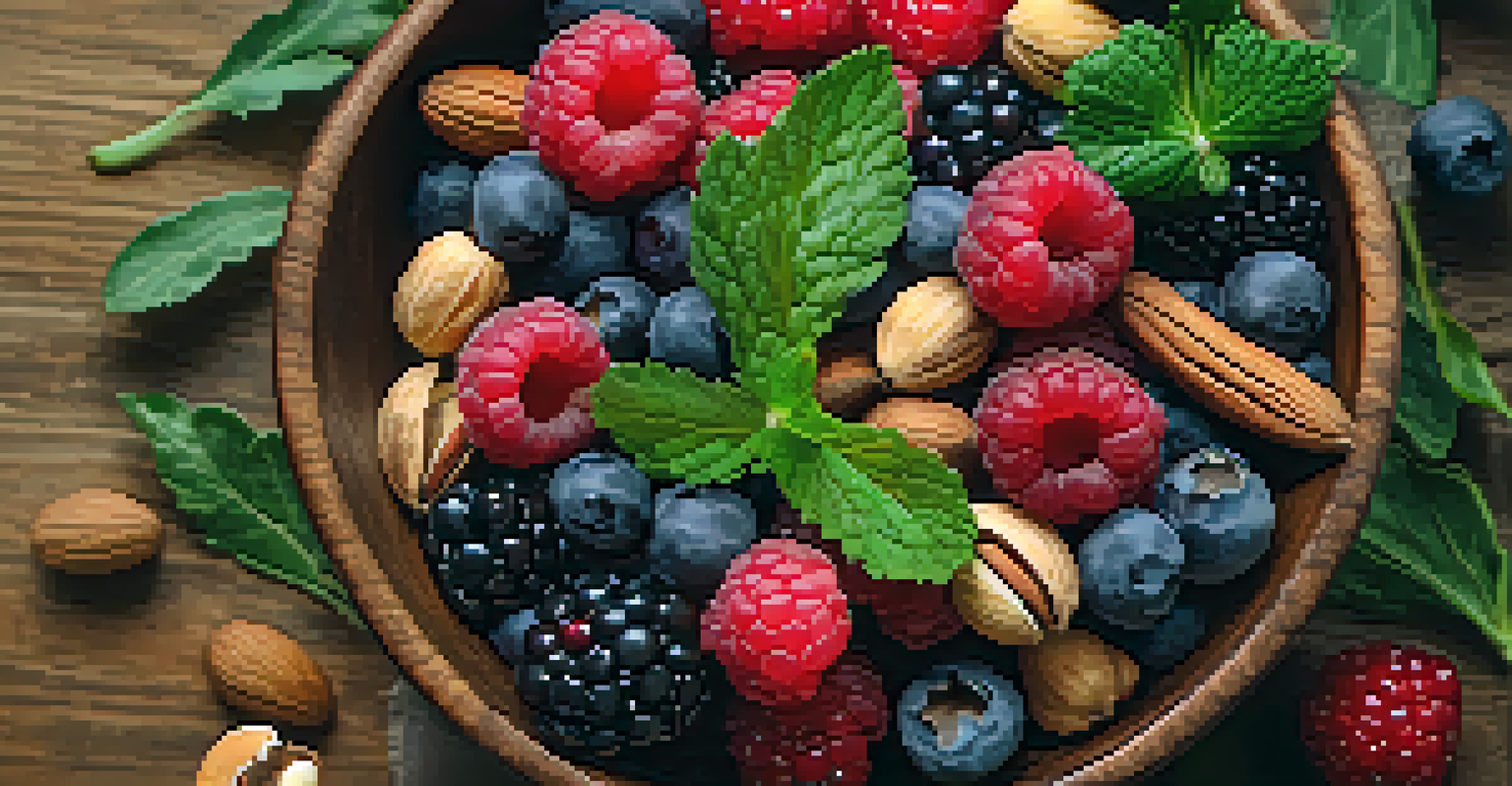Nutrition and Skin Health: Foods for Radiant Skin

Understanding the Connection Between Nutrition and Skin Health
Nutrition plays a crucial role in maintaining skin health, impacting everything from hydration to elasticity. Just like a car needs fuel to run smoothly, our skin requires specific nutrients to thrive. When we nourish our bodies with the right foods, we can enhance our skin’s appearance and overall vitality.
Let food be thy medicine and medicine be thy food.
Think of your skin as a canvas that reflects your internal health. Poor nutrition can lead to visible signs of aging, dullness, and breakouts. By understanding how different foods affect our skin, we can make informed choices to achieve that radiant glow we all desire.
Moreover, a balanced diet rich in vitamins, minerals, and antioxidants can help combat skin issues. These nutrients work synergistically to protect against environmental damage and support skin repair, making it essential to prioritize what we eat.
Hydrating Foods: Quenching Your Skin's Thirst
Hydration is key to maintaining skin elasticity and preventing dryness. Foods with high water content, like cucumbers, watermelon, and oranges, can help keep your skin hydrated from the inside out. Incorporating these into your diet not only benefits your skin but also supports overall health.

Think of your skin as a sponge; when it’s well-hydrated, it remains plump and youthful. Conversely, dehydration can lead to a sallow complexion and fine lines. By adding hydrating foods to your meals, you can boost your skin's moisture levels naturally.
Nutrition Boosts Skin Health
A balanced diet rich in nutrients enhances skin vitality and appearance.
Additionally, these foods often come packed with vitamins and antioxidants, further enhancing their benefits for skin health. So, next time you're feeling parched, reach for a hydrating snack instead of a sugary drink!
Antioxidant-Rich Foods: Fighting Free Radicals
Antioxidants are powerful compounds that help protect our skin from free radical damage caused by pollution and UV rays. Foods like berries, nuts, and dark leafy greens are excellent sources of antioxidants. These foods can reduce inflammation and promote a more youthful appearance.
You are what you eat.
Imagine antioxidants as the bodyguards of your skin, standing watch against external aggressors. By consuming a diet rich in these protective nutrients, you empower your skin to defend itself more effectively. This not only helps with aging but can also improve the overall clarity of your complexion.
Moreover, different antioxidants have specific benefits. For instance, vitamin C found in citrus fruits helps with collagen production, while vitamin E in almonds can enhance skin hydration. Incorporating a variety of antioxidant-rich foods can provide a comprehensive defense strategy for your skin.
Healthy Fats: Nourishing Your Skin from Within
Healthy fats, such as omega-3 fatty acids found in fish, flaxseeds, and walnuts, are crucial for maintaining skin health. These fats help keep the skin barrier intact, preventing moisture loss and reducing inflammation. When your skin is well-nourished, it appears more radiant and youthful.
Think of healthy fats as your skin's best friends, working behind the scenes to maintain its elasticity and softness. Without adequate healthy fats in your diet, your skin may become dry and flaky. Including sources of healthy fats can significantly improve your skin's texture and appearance.
Hydration is Key for Skin Elasticity
Incorporating hydrating foods helps maintain skin moisture and prevent dryness.
Furthermore, omega-3s can help manage conditions like acne and psoriasis. By prioritizing these fats in your meals, you're not just indulging your taste buds but also boosting your skin's health.
Vitamin C: Your Skin's Best Ally for Brightness
Vitamin C is a powerhouse nutrient known for its brightening properties. Found in citrus fruits, strawberries, and bell peppers, this vitamin helps brighten the skin and even out skin tone. It also plays a vital role in collagen production, which is essential for maintaining skin firmness.
Picture vitamin C as the spotlight that illuminates your skin, helping to reduce the appearance of dark spots and blemishes. When included in your diet, it can lead to a more vibrant and youthful complexion. The brighter the skin, the more confident you feel!
In addition to these benefits, vitamin C is also an antioxidant, providing an extra layer of protection against environmental stressors. Including vitamin C-rich foods in your diet can make a noticeable difference in your skin’s overall health and appearance.
Zinc: The Mineral for Clearer Skin
Zinc is an essential mineral that plays a vital role in skin health, particularly for its healing properties. It's found in foods like chickpeas, nuts, and whole grains. Zinc helps regulate oil production and can be especially beneficial for those prone to acne.
Imagine zinc as a skilled repairman for your skin, helping to mend wounds and reduce inflammation. By incorporating zinc-rich foods into your diet, you can not only support clearer skin but also enhance its overall resilience. This mineral aids in skin renewal, making it crucial for maintaining a fresh complexion.
Probiotics Promote Glowing Skin
Healthy gut bacteria from probiotic foods can lead to clearer skin and reduced inflammation.
Moreover, zinc has antioxidant properties, which further supports skin health by combating free radical damage. If you're looking for ways to improve your skin's clarity, consider adding more zinc-rich foods to your meals.
Probiotics: Balancing Your Gut for Glowing Skin
Probiotics are beneficial bacteria that play a significant role in gut health, which in turn can impact your skin. Foods like yogurt, kefir, and fermented vegetables are excellent sources of probiotics. A healthy gut can lead to reduced inflammation and a clearer complexion.
Think of probiotics as the friendly neighbors that keep the peace in your gut community. When your gut is balanced, it can help prevent skin issues such as acne and eczema. The connection between gut health and skin health is becoming increasingly recognized, making probiotics an essential addition to your diet.

Moreover, a healthy gut can improve nutrient absorption, ensuring that your skin receives the necessary vitamins and minerals it needs to thrive. By incorporating probiotic-rich foods, you can create a solid foundation for radiant skin.